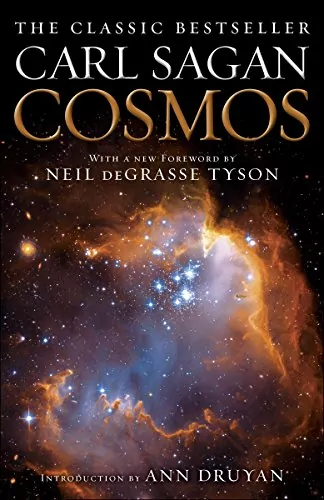“Cosmos” by Carl Sagan, with an introduction by Ann Druyan and a foreword by Neil deGrasse Tyson, is a true classic in the realm of popular science literature. It’s a book that captivates and inspires wonder about the universe we inhabit.
Sagan’s narrative style is both poetic and accessible, making complex scientific concepts understandable and engaging for readers of all backgrounds. He takes us on an awe-inspiring journey across fourteen billion years of cosmic evolution, weaving together the birth of stars, the development of galaxies, and the emergence of life on Earth.
One of the most striking aspects of “Cosmos” is how Sagan connects the vastness of the universe with our own human experience. He delves into the origin of life and the evolution of human intelligence, contemplating our place and role in the universe. The book also serves as a historical voyage, highlighting the key figures and developments in science that have shaped our current understanding of the cosmos.
The updated edition, featuring Druyan’s introduction and Tyson’s foreword, enriches the original content with contemporary insights and reflections, adding to the book’s depth and relevance in today’s world.
Sagan’s work is not just about facts and theories; it’s about instilling a sense of wonder and a hunger for knowledge. His lyrical writing style and broad coverage of topics – from astronomy to history, philosophy to biology – make “Cosmos” a book that’s not just educational but also deeply inspiring. It encourages readers to ponder not just the mechanics of the cosmos, but also the more profound questions of our existence and our future as a species.
In summary, “Cosmos” stands as a testament to the beauty and complexity of the universe, as well as the human quest for understanding. It’s a book that has profoundly impacted the way we view the world around us, igniting curiosity and a sense of wonder in countless readers. For anyone interested in the stars, the planets, and beyond, “Cosmos” is an essential read that transcends the boundaries of mere science literature to become a timeless exploration of our place in the universe.
What Does Cosmos mean?
Cosmos means universe 1. The word cosmos comes from the Greek word Kosmos which refers to “order, harmony, and the world” 2. For Carl Sagan, “Cosmos is a Greek word for the order of the universe. It is, in a way, the opposite of Chaos. It implies the deep interconnectedness of all things. It conveys awe for the intricate and subtle way in which the universe is put together”.
Cosmos by Carl Sagan is a groundbreaking science book that explores the universe and humankind’s place in it. Sagan takes readers on a journey through time, starting with the Big Bang and tracing the evolution of matter into consciousness. He examines such topics as space exploration, the death of stars, galaxies’ evolution, and how ancient cultures viewed the Cosmos. Cosmos also explores the stories of the people who helped to shape modern science, such as Copernicus and Einstein.
It also covers the importance of science in today’s world and what humankind can do to protect our planet. Cosmos is an inspiring read that will leave readers with a greater appreciation for the Cosmos, and a better understanding of their own place within it. Cosmos by Carl Sagan is an essential book for all those interested in astronomy, cosmology, astrophysics, and the history of science.
With full-color illustrations, a new introduction by Sagan’s collaborator, Ann Druyan, and a foreword by astrophysicist Neil deGrasse Tyson, Cosmos continues to be a timeless classic that inspires readers to reflect on their place in the Cosmos.
Books contents:
- The Shores of the Cosmic Ocean
- One Voice in the Cosmic Fugue
- The Harmony of Worlds
- Heaven and Hell
- Blues for a Red Planet
- Travelers’ Tales
- The Backbone of Night
- Travels in Space and Time
- The Lives of the StarsThe Edge of Forever
- The Persistence of Memory
- Encyclopaedia Galactica
- Who Speaks for Earth
Here are some ideas that stood out to me from reading Carl Sagan Cosmos
Ancient Alexandria: Cradle of Space Exploration
Ancient Alexandria (Egyptian city) is where the journey towards space exploration started. Carl Sagan Cosmos book devoted an important part of to talk about the central place the city played in the development of ancient civilisations. As a matter of fact, it was in Alexandria that the embryonic idea of space exploration was first conceived and nurtured.
“Six hundred years beginning around 300 B.C.”, as Sagan explained, “ that human beings, in an important sense, began the intellectual adventure that has led us to the shores of space.” Ancient Alexandria, as gracefully depicted by Sagan, was essentially a melting pot of different races, cultures and ethnicities.The cosmopolitan city was founded by Alexander the Great and was built by his bodyguard.
Alexander the Great
Alexander the Great cherished a fond love for knowledge and learning and, according to Sagan, he used to encourage respect for different cultures and religions. He embraced interracial marriage and “encouraged his generals and soldiers to marry Persian and Indian women”. In today’s lingo, Alexander the Great was liberal to the core, or at least that is how Sagan represented him in Cosmos.
Regardless of whether he indeed embraced those values or not, Alexander the Great was a charismatic leader who turned ancient Alexandria into “the world center of commerce, culture and learning”. Indeed, the succeeding Greek kings of Egypt followed suit. They, too, encouraged scholarship and maintained one of the world’s oldest libraries ever: the Great Library of Alexandria which was and is till located in the Egyptian city of Alexandria.
The Great Library of Alexandria
In Cosmos, Sagan talked at length about the great library of Alexandria describing it as “the first true research institute in the history of the world”, one that sparked the learning revolution that would forever transform the world. At its heights, the library contained an estimate of half a million volumes in the form of handwritten papyrus scroll covering different languages and cultures. A huge number of these materials were bought from libraries abroad. It was also a common practice for police at the time to search docked commercial ships and confiscate books to be copied and returned back to their owners.
The great library of Alexandria, as Sagan contended, “contained ten large research halls, each devoted to a separate subject; fountains and colonnades; botanical gardens; a zoo; dissecting rooms; an observatory; and a great dining hall where, at leisure, was conducted the critical discussion of ideas.”
The library attracted the greatest minds of the day turning Alexandria into a mecca for scholars across different disciplines from astronomy and literature, to biology, physics, geography, mathematics, medicine, and philosophy. The ALexandrian Library, as Sagan noted, “is where we humans first collected, seriously and systematically, the knowledge of the world”.
Reading these historical facts, and as much as I feel an overwhelming sense of respect and admiration for this ancient civilization, I also feel a profound sense of sorrow and sadness for the current fate of what was once the world’s capital of knowledge and scholarship. “Oppression and the fear of learning”, as Sagan argued, “obliterated almost all memory of ancient Alexandria”. Today, only “a few moldering shelves maybe it’s only physical remains”.
References
- 1. https://www.merriam-webster.com/dictionary/cosmos
- 2. https://www.britannica.com/science/Cosmos-astronomy







